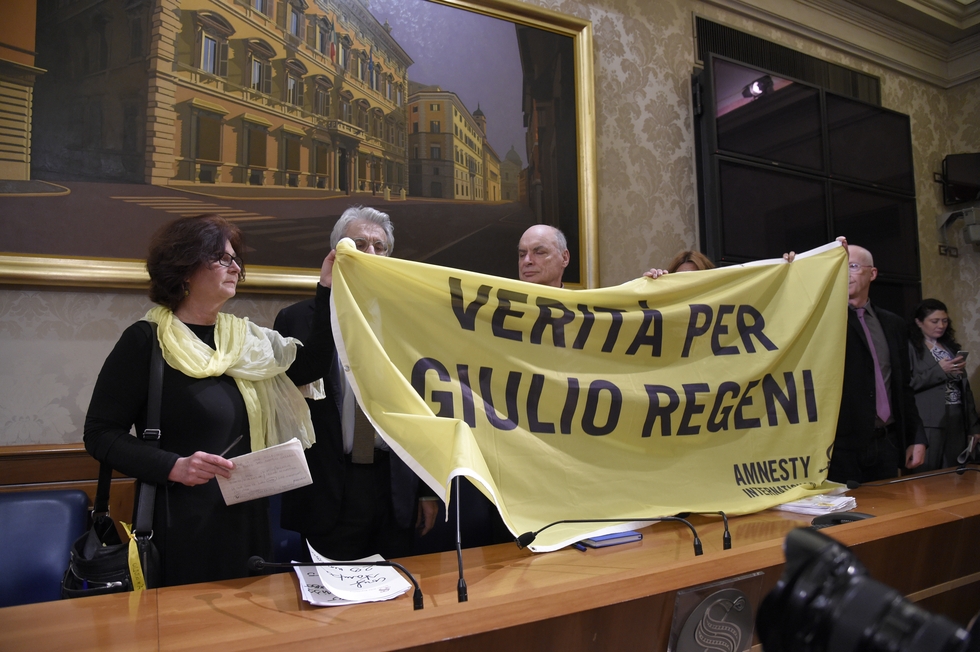Rome recalls ambassador to Cairo over murder of Italian student

Italy on Friday recalled its ambassador to Egypt for consultations in protest over the lack of progress in a probe into the fate of murdered Cambridge student Giulio Regeni.
The move came after two days of talks between Egyptian and Italian investigators in Rome ended without a resolution of tensions between the two countries over the fate of 28-year-old Regeni, whose tortured and mutilated body was discovered outside Cairo on February 3.
"We want only one thing, the truth about what happened to Giulio," Foreign Minister Paolo Gentiloni said in a tweet.
A statement by the Rome prosecutor in charge of the case said that the Egyptians had handed over phone records of two of Regeni's Italian friends who were in Cairo at the time of his disappearance, as well as photos taken on the day his body was discovered.
The statement made no mention of CCTV footage of the neighbourhood from which Regeni disappeared on 25 January, which the Italians had asked to see, or whether Regeni was under surveillance prior to his abduction.
The Egyptian team indicated that they were still considering the possibility Regeni was abducted by an anti-foreigner criminal gang whose members all died in a police shootout last month.
The Italian prosecutor "reiterated his conviction that there are no elements to directly link the gang to the torture and death of Giulio Regeni," the statement said.
Egypt's presentation of the criminal gang theory has been greeted with outraged scepticism in Italy and has helped fuel public anger over the case, putting intense pressure on Prime Minister Matteo Renzi to be seen to be getting tough with Cairo.
Business deals
With the case threatening to derail relations between two countries with major economic and strategic ties, the Egyptian team of two prosecutors and three senior police figures had flown to Rome in a bid to reassure their Italian counterparts everything was being down to bring Regeni's killers to justice.
Italy had warned this week of diplomatic retaliation if the perceived foot-dragging of the Egyptians did not stop.
Before the criminal gang theory was aired, Italian officials were variously told that Regeni had died in a car accident and that his death was linked to his personal life.
The withdrawal of the ambassador is unlikely to satisfy those who are demanding that Renzi send a strong signal of Italy's anger over the case to Egypt's military-backed president, Abdel Fattah al-Sisi.
Renzi has a close relationship with Sisi which has helped generated hugely valuable business contracts for Italian companies, particularly in the energy sector.
Italy will also count on Egyptian cooperation if it leads an international peacekeeping force into Libya to try and stabilise its former north African colony.
Media coverage of the Regeni has served as a focus for other disappearances and rights abuses in Egypt.
Italian officials suspect their compatriot was killed by rogue elements in the Egyptian security services. Their Egyptian counterparts have so far maintained there is no basis for such claims.
In terms of action, Italy's options are limited.
Moves under consideration include a warning to its citizens against travel to Egypt but the Regeni case has already caused a slump in visitor numbers from Italy.
Italy is also considering asking for support from its EU partners to try and put pressure on the Egyptian government over the case.
Middle East Eye propose une couverture et une analyse indépendantes et incomparables du Moyen-Orient, de l’Afrique du Nord et d’autres régions du monde. Pour en savoir plus sur la reprise de ce contenu et les frais qui s’appliquent, veuillez remplir ce formulaire [en anglais]. Pour en savoir plus sur MEE, cliquez ici [en anglais].

